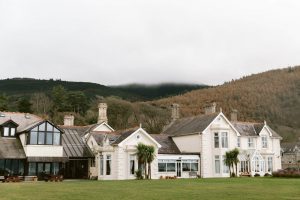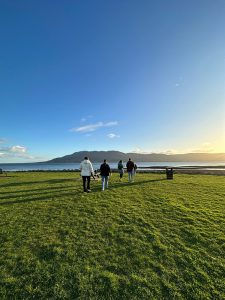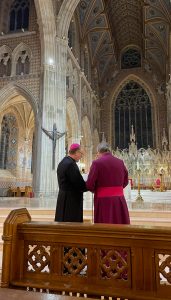Northern Ireland — a place of rolling green hills and bright yellow daffodils. Of sheep that lie in green pastures and birds that soar over still waters. A place of great beauty, but also a place with a deep-rooted history of violence and division. It was here that I had the privilege of joining an all-girls team on a mission trip through SEU Missions. This trip was incredibly enlightening as we learned a different way of doing ministry and missions, and a new way of seeing people, the world, and the Gospel. Here are some of the things we learned, saw, and heard during our time in Northern Ireland.
To fully understand the nature of this trip, I think it is important to know the history and culture of Christianity in Ireland. 
For those who don’t know, the island of Ireland is split into the Republic of Ireland and Northern Ireland. This is the result of the Government of Ireland Act of 1920, which was passed by the UK Parliament in an attempt to reconcile the growing conflict between Irish nationalists (predominantly Catholic) and unionists (predominantly Protestant). The unionists wished to remain under British rule, while the nationalists wanted freedom and independence apart from Great Britain. This led to the Irish War of Independence, which then led to the Anglo-Irish Treaty of 1921. This treaty ended this war and allowed the Republic of Ireland to separate from Great Britain and become the New Irish Free State. This treaty also led to the renewal of civil war and years of hostility and violence between the unionists and nationalists. This period of violence, known as The Troubles, was fueled by the anger of the Catholic minority in Northern Ireland who felt they were being discriminated against by the Protestant majority.
The Troubles lasted for more than 30 years, from the early 1960s to the late 1990s. This time was marked by car bombings and riots which led to the deaths of many, causing a bigger divide between Catholics and Protestants. The Good Friday Agreement of 1998 is said to have been the end of The Troubles, though some who have lived and experienced it will tell you that the violence didn’t end until the early 2000s. Regardless of when it ended, you can still see the effects of it on the people of Northern Ireland today.
While in Northern Ireland, we partnered with YWAM An Cuan, located in the village of Rostrevor. An Cuan (on-koo-in) is Irish for “The Harbour,” and it is a place where people can go to rest, be restored, and equipped to be sent back out into the world. The heart of their ministry is peace and reconciliation, which was also the ministry put on the hearts of our trip leaders, Claire and Bella, during their planning process. YWAM An Cuan is very involved within the community and hosts lots of community events, such as worship gatherings, ministry nights, craft markets, and much more. Their doors are always open. 
Our team stayed at the base and really got to know the staff and students there. The sense of community we found was special and rare. It reminded me of the description given to us of the early church in the book of Acts — in which the believers lived in loving community together, sharing all things, and were of one heart, one mind, and in one accord. The ease with which they welcomed our team made us feel right at home, and for the ten days we were there, we truly felt like we were doing life with them.
What was really inspiring was their heart for people — for the hurting, the rejected, and the lost. They wanted nothing more than for others to take part in the love, peace, and joy that they themselves have experienced through Christ, and they invited us to join them in this mission.
 The ministry we did in Northern Ireland involved a lot of evangelism and outreach. There were some days where we would go out into town with the goal of starting conversations with people. What we quickly learned was that the way you do evangelism and outreach in Northern Ireland is drastically different then the way you would do it in places like Africa or Asia. One of my teammates, who goes to Africa every year for missions, put it this way:
The ministry we did in Northern Ireland involved a lot of evangelism and outreach. There were some days where we would go out into town with the goal of starting conversations with people. What we quickly learned was that the way you do evangelism and outreach in Northern Ireland is drastically different then the way you would do it in places like Africa or Asia. One of my teammates, who goes to Africa every year for missions, put it this way:
“In Africa, the people there are hungry for a new thing. They know about the spiritual, and are often eager to hear about who Jesus is and what He’s done for us. They come to you with open hearts and open hands. Here, in Northern Ireland, people don’t seem to want to hear what you have to say. Their hands are closed and tightened into fists.”
We found it difficult to start up conversations with people, as most weren’t willing to speak with us. When we were lucky enough to grab a few minutes of someone’s time, we had to be very careful and intentional with our word choice. Much of this had to do with the hurt that still lingers from the time of The Troubles. Some people want nothing to do with Christianity – the thing that has been used as a weapon and caused years of turmoil and anguish in their country, and understandably so. There were some conversations in which we didn’t get to tell the other person about Jesus at all, and that was okay. What was important was that we were relational. We wanted to genuinely get to know the person and make them feel seen and valued — not like they were just another number to check off on our the list.
When you read about the life of Jesus, you see that most of His ministry was simply being present with people. He had intentional conversations, listened to others, and dined with them. He was incredibly inviting and hospitable. And He was humble. He didn’t feel the need to exalt Himself and exert His power over others, though He had every right to. He met people where they were and took on the form of a servant.
Our experience taught us the importance of the ministry of presence and laying down our expectations at His feet. Were there times when we walked away from a conversation disappointed, wishing we had said more? Yes, absolutely. Yet, even in the midst of our disappointment we could rest in the fact that His ways are higher than ours and that He is able to do exceedingly more than we could ever ask for or imagine through a simple conversation.
This experience also gave us a greater understanding and appreciation of our contacts and the people who have dedicated their lives to doing mission work in Ireland. They work hard and often don’t see the rewards and fruits of their labor until years later. Yet they remain faithful and continue to plow ahead faithfully and with joy.
In preparation for St. Patrick’s Day, we went to this town about thirty minutes away from Rostrevor, called Armagh, to speak with people and share the true meaning of St. Patrick’s Day with them. There, we were able to attend an event in which we heard a Catholic bishop and a Protestant bishop share their views on St. Patrick and his impact. After hearing so much of the history of division between Catholics and Protestants, it was amazing to be in a room filled with people from both backgrounds.
 Later that night, we had the privilege of attending a St. Patrick’s Day service, held by the Catholic bishop, at St. Patrick’s Cathedral. Right after that, we then attended the service of the Protestant bishop at his cathedral on the other side of town. The two bishops joined together for this service, and what happened next was probably one of the most surreal and beautiful experiences of my life. The bishops led us on a peace and prayer walk from that cathedral, back to the other one. I remember getting emotional at the significance of that moment. Here were two previously opposing groups, with years of discord and violence between them, joining together to pray for peace and reconciliation for the people of Ireland.
Later that night, we had the privilege of attending a St. Patrick’s Day service, held by the Catholic bishop, at St. Patrick’s Cathedral. Right after that, we then attended the service of the Protestant bishop at his cathedral on the other side of town. The two bishops joined together for this service, and what happened next was probably one of the most surreal and beautiful experiences of my life. The bishops led us on a peace and prayer walk from that cathedral, back to the other one. I remember getting emotional at the significance of that moment. Here were two previously opposing groups, with years of discord and violence between them, joining together to pray for peace and reconciliation for the people of Ireland.
It was a testament of the power of the Gospel of Christ. He tears down the dividing wall, making two groups one, and ushers in a peace that surpasses all understanding. What a privilege it was to be a part of that.
The weekend after St. Patrick’s Day, the base was hosting an annual three day staff retreat for multiple different YWAM bases around Ireland. There were close to 90 people staying at the base with us, including families with children. Usually when they host these retreats, there isn’t anyone to watch the youth, and so a big way we were able to serve these families was by watching their kids so that the parents could be fully present at the sessions. For each day we were with the kids, we put together worship, a short devotional, and tons of fun games. We also helped cook and serve the meals for the week, and we loved getting to know these families, their kids, and their hearts for missions. We were deeply inspired by these families and their passion for reaching the lost.
There is so much more I could say about this trip and what it meant to myself and my team. It often feels hard to put into words and something that is better experienced than said. On this trip, we learned to see and love people in a new way. We had to learn to see past the barriers set before us and intentionally pursue relationships. We learned to love our brothers and sisters in Christ better – especially those who come from different backgrounds and denominations. We learned what it looked like to live in loving community with one another and I’ll forever cherish the conversations and stories shared over meals each day.
But most importantly, we learned to see and live out the Gospel in a new way. A Gospel with a heartbeat of reconciliation — the mending of that which has been broken. There is no room for discord or shame. We have a Savior who is making a way where there seems to be none, tearing down the dividing wall and making two groups one. His is a Gospel of peace and reconciliation, and what a beautiful thing it was to witness that at work within the people of Northern Ireland, and within ourselves.
Thank you Scott, Michaela, Jonny, and everyone at YWAM An Cuan for all that you have poured into us, and for welcoming us into your lives and allowing us to partner with you in all that the Lord has done and is doing in Northern Ireland.
By Mia Golding, Student Writer